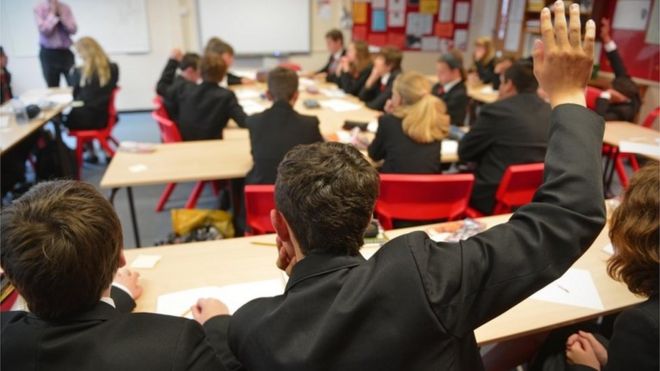
Plans to turn every state school in England into an academy have been criticised by Conservative councillors.
Several have called for the policy to be reversed, including the councillor responsible for education in David Cameron’s Oxfordshire constituency.
Melinda Tilley denounced the “diktats from above” and said the policy could put small village schools at risk.
The government has said schools must become academies or be in the process of converting by the end of 2020.
Chancellor George Osborne made the announcement during the Budget but, after being forced to abandon his plans for disability cuts because of Conservative opposition, he now faces pressure over another key feature of his speech.
Ms Tilley told BBC Radio 4’s Today programme: “I’m fed up with diktats from above saying you will do this and you won’t do that. This is not why I became a Conservative.”
One normally loyal MP said: “When you have a decent local authority and broadly speaking have good schools and good leadership why on earth would you force people down this route?”
Schools minister Nick Gibb told Today the proposals were aimed at giving “more autonomy to professionals” who would be freed from “interference from the local authority”.
He said “the winning formula” of multi-academy trusts would be used to “change weaker schools” run by local authorities.
“You can’t have two systems. You have to have one consistent system,” he said.
“There are many weak local authorities that have not been as rigorous on ensuring that under-performing schools improve the academic standards of the children as they should be.”
What is an academy school?
Academies are independent, state-funded schools, which receive their funding directly from central government, rather than through a local authority.
The day-to-day running of the school is down to the head teacher or principal, but they are overseen by individual charitable bodies called academy trusts and may be part of an academy chain.
These trusts and chains provide advice, support, expertise and a strategic overview.
They control their own admissions process and have more freedom than other schools to innovate.
Read more: What it means to be an academy school
Another unnamed MP said the move would remove competition from the education system, and added that ministers would face pressure from backbenchers to abandon the plans.
There are also concerns that schools will no longer be obliged to have parents among their governors.
A Department for Education spokesman said: “To drive up standards we will encourage more schools to work together in multi-academy trusts so they share resources, staff and expertise.”
The department says the trusts will better support small rural schools.
Roger Gough, Conservative councillor in charge of education in Kent, said: “I don’t think there is demonstrable evidence that there is a systemic improvement in performance and certainly not anything that would justify upheaval on this scale.”
‘Ideological approach’
Conservative Peter Edgar, from Hampshire County Council, said: “To force all schools would be ridiculously expensive and in my view the wrong thing to do and also could cause in the interim a drop in standards in all our schools.
“This was not in the [Conservatives’ election] manifesto,” he said. “This is a step too far.”
Laura McInerney, editor of Schools Week magazine, told Today the conversion process would be “quite expensive” and legal fees could be “huge”.
She said there was a feeling that money the Treasury had earmarked for conversion costs “isn’t enough”.
Patrick Roach, deputy general secretary of teachers union the NASUWT, criticised the government for taking “an ideological approach” to schools.
“It’s not universally the case that academisation creates good or outstanding schools. We have a mixed picture both within academies and within community local authority-controlled schools,” he told BBC Radio 5 live.
“What’s key to raising standards is good teaching and learning, and investment in the teacher workforce.”
Steph Neale, head teacher at the Beatrix Potter primary school in south London, said: “If a head is really good, then results will go up whether it’s an academy, a state school, a free school – it doesn’t matter.
“It’s about who’s running it and how it’s run.”
[SOURCE :-bbc]



